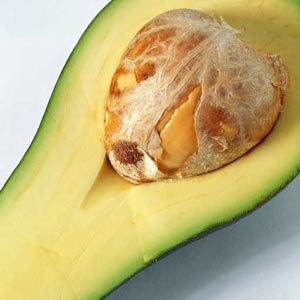Background
The avocado gets its name from the Latin American Nahuatl ahuacatl
meaning “testicle,” referring to its shape. It was discovered in Mexico
approximately 291 B.C. and the Spanish eventually brought it to England
where Sir Henry Sloane gave it its more easily pronounced modern name
‘avocado’. Avocado only became a worldwide commercial crop in the early
1900, making its first appearance in SA on a farm outside Durban in
1930 where an Indian farmer planted the first West Indian seedlings.
Choosing avos
Because of all the handling and squeezing going on in the supermarkets,
rather buy your avocados rock hard and allow them to ripen at home.
This will take from 2 to 7 days, even quicker if you store it in a
brown paper bag, away from direct sunlight, with a ripe banana or
apple. Look for fruit that have no bruises, are uniform in shape and
survive the shake test, if you shake the avo, you shouldn’t hear/feel
the pip shaking inside.
Types found in SA
Hass
The hass is a smallish, roundish or egg-shaped fruit with a thick,
green, pebbly skin that changes colour to purple or black when ready to
eat. The skin is quite hard, even when the fruit is ripe, so you have
to rely on the colour change to know when it’s ripe.
Fuerte
The Feurte is a popular SA avocado, and ‘out of
season’ fruit is available year round. It is a medium-sized,
pear-shaped, fruit, sometimes with a long, thinner neck. The skin is
smooth and thin and stays green coloured when ripe
Pinkerton
An American cultivar, the Pinkerton is distinguished from other
varieties through it’s definite thickish neck. It has thick, rough
green skin that stays green when ripe and protects the flesh somewhat
from bruising.
Edranol
The Edranol is an oval fruit with thick olive green, glossy skin with small black speckles (called lenticels).
Ryan
The Ryan is the least popular of the SA avocado varieties. It’s a
heavy, egg-shaped fruit with a green, slightly rough skin and large pip
They are so healthy
Because avocados are usually eaten uncooked, they don’t lose their high
folic acid content, which is recommended for pregnant women and assists
the development of the foetus. They’re also loaded with a host of
nutrients and dietary fibre to help fight chronic illnesses such as
heart disease and cancer. And although they were once regarded as bad
for the arteries, the avocado is now regarded as a disease-fighter,
containing absolutely no cholesterol, and loads of ‘good’ fat that
actually protects arteries.
Eight things to do with avocados
Baked avocado with prawns and white wine dressing
Avocado and roquefort toasted sandwiches

